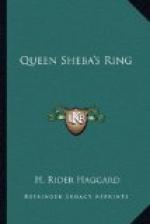“I do not know,” answered Oliver. “If our brother were here, he whom the Fung have captured, he might know, being learned in the ways of idol-worshipping, savage peoples.”
“Alas! O Son of Orme,” she said, “thanks to that traitor whom but now we have condemned, he is not here and, perhaps, could tell us nothing if he were. At least, the saying runs as I have spoken it, and for many generations, because of it, we Abati have desired to destroy the idol of the Fung to which so many of us have been offered in sacrifice through the jaws of their sacred lions. Now I ask,” and she leaned forward, looking at Oliver, “will you do this for me?”
“Speak of the reward, my niece,” broke in Joshua in his thick voice when he saw that we hesitated what to answer, “I have heard that these Western Gentiles are a very greedy people, who live and die for the gold which we despise.”
“Ask him, Captain,” exclaimed Quick, “if they despise land also, since yesterday afternoon I saw one of them try to cut the throat of another over a piece not bigger than a large dog-kennel.”
“Yes,” I added, for I confess that Joshua’s remarks nettled me, “and ask him whether the Jews did not despoil the Egyptians of their ornaments of gold in the old days, and whether Solomon, whom he claims as a forefather, did not trade in gold to Ophir, and lastly whether he knows that most of his kindred in other lands make a very god of gold.”
So Orme, as our spokesman, put these questions with great gusto to Joshua, whom he disliked intensely, whereat some of the Council, those who were not of the party of the Prince, smiled or even laughed, and the silvery ornaments upon Maqueda’s dress began to shake again as though she also were laughing behind her veil. Still, she did not seem to think it wise to allow Joshua to answer—if he could—but did so herself, saying:
“The truth is, O my friends, that here we set small store by gold because, being shut in and unable to trade, it is of no use to us save as an ornament. Were it otherwise, doubtless we should value it as much as the rest of the world, Jew or Gentile, and shall do so when we are freed from our foes who hem us in. Therefore, my uncle is wrong to claim as a virtue that which is only a necessity, especially when, as your servant says,” and she pointed to the Sergeant, “our people make land their gold and will spend their lives in gaining more of it, even when they have enough.”
“Then do the Gentiles seek no reward for their services?” sneered Joshua.
“By no means, Prince,” answered Oliver, “we are soldiers of fortune, since otherwise why should we have come here to fight your quarrel” (laying an unpleasant emphasis on the “your”) “against a chief who, if half savage, to us seems to have some merits, those of honour and courage, for instance? If we risk our lives and do our work, we are not too proud to take whatever we can earn. Why should we be, seeing that some of us need wealth, and that our brother, who is as good as dead yonder, owing to the treachery of those who were sent to guard him, has relatives in England who are poor and should be compensated for his loss?”




